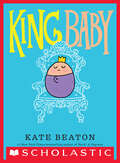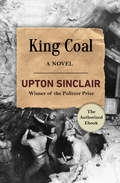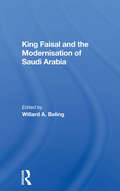- Table View
- List View
Kindred Souls: The Devoted Friendship of Eleanor Roosevelt and Dr. David Gurewitsch
by Edna P. GurewitschThe poignant and unforgettable true account of the deep, loving friendship between a handsome physician and the former First Lady"I love you as I love and have never loved anyone else." --Eleanor Roosevelt in a letter to Dr. David Gurewitsch, 1955 She was the most famous and admired woman in America. He was a strikingly handsome doctor, eighteen years her junior. Eleanor Roosevelt first met David Gurewitsch in 1944. He was making a house call to a patient when the door opened to reveal the wife of the president of the United States, who had come to help her sick friend. A year later, Gurewitsch was Mrs. Roosevelt's personal physician, on his way to becoming the great lady's dearest companion--a relationship that would endure until Mrs. Roosevelt's death in 1962. Recounting the details of this remarkable union is an intimately involved chronicler: Gurewitsch's wife, Edna. Kindred Souls is a rare love story--the tale of a friendship between two extraordinary people, based on trust, exchange of confidences, and profound interest in and respect for each other's work. With perceptiveness, compassion, admiration, and deep affection, the author recalls the final decade and a half of the former First Lady's exceptional life, from her first encounter with the man who would become Mrs. Gurewitsch's husband through the blossoming of a unique bond and platonic love. Blended into her tender reminiscences are excerpts from the enduring correspondence between Dr. Gurewitsch and the First Lady, and a collection of personal photographs of the Gurewitsch and Roosevelt families. The result is a revealing portrait of one of the twentieth century's most beloved icons in the last years of her life--a woman whom the author warmly praises as "one of the few people in this world in which greatness and modesty could coexist."
King Al: How Sharpton Took the Throne
by Ron HowellThe incredible story of the man and legend who has come to symbolize the continuing pursuit of justice for Blacks in the United StatesThrough the 1980s, the mainstream press portrayed the Reverend Al Sharpton as a buffoon, a fake minister, a hustler, an opportunist, a demagogue, a race traitor, and an anti-Semite. Today, Sharpton occupies a throne that would have shocked the white newspaper reporters who covered him forty years ago. A mesmerizing story of astounding transformation, craftiness, and survival, King Al follows Reverend Sharpton’s life trajectory, from his early life as a boy preacher to his present moment as the most popular Black American activist/minister/cable news host.In the 1980s, Rev. Al created controversies that would have doomed a lesser man to the dustbin of history. Among these controversies were his work with the FBI as the agency attempted to locate Black Liberation Army leader Assata Shakur; and his involvement in the 1987 Tawana Brawley episode. Regarding the Brawley matter, a white prosecutor sued Sharpton, successfully, for falsely accusing him of having raped the then-fifteen-year-old Brawley.It was the white press, in its glory days, that created the podium from which Sharpton became both famous and infamous. Those reporters would joke that the most dangerous place in New York was between Al Sharpton and a television camera. But it was those reporters who made Sharpton the media figure he is today.Today, as host of MSNBC’s PoliticsNation news program, Sharpton has more news viewers than those reporters ever had readers.The Reverend Al’s rise to respectability is a testament to an endurance and boldness steeped in Black American history. Born in Brooklyn to parents from the old slave-holding South, he transformed himself into one of the most respected and politically influential Blacks in the United States.In his in-depth coverage, author Ron Howell tells the stories of Sharpton’s ascendance to the throne. He tells us about the glory years of American newspapers, when Sharpton began his rise. And he tells us about the politicians who intersected with Sharpton as he climbed the ladder.King Al is an engaging read about the late-twentieth-century history of New York City politics and race relations, as well as about the remarkable staying power of the colorful, politically skillful, and enigmatic Sharpton.
King Alfonso VIII of Castile: Government, Family, and War (Fordham Series in Medieval Studies)
by Miguel Gómez, Damian Smith, and Kyle C. LincolnKing Alfonso VIII of Castile: Government, Family and War brings together a diverse group of scholars whose work concerns the reign of Alfonso VIII (1158–1215). This was a critical period in the history of the Iberian peninsula, when the conflict between the Christian north and the Moroccan empire of the Almohads was at its most intense, while the political divisions between the five Christian kingdoms reached their high-water mark. From his troubled ascension as a child to his victory at Las Navas de Tolosa near the end of his fifty-seven-year reign, Alfonso VIII and his kingdom were at the epicenter of many of the most dramatic events of the era.Contributors: Martin Alvira Cabrer, Janna Bianchini, Sam Zeno Conedera, S.J., Miguel Dolan Gómez, Carlos de Ayala Martínez, Kyle C. Lincoln, Joseph O’Callaghan, Teofi lo F. Ruiz, Miriam Shadis, Damian J. Smith, James J. Todesca
King Arthur and the Knights of the Round Table
by Howard PyleA simultaneously charming and violent re-telling of the rise and fall of King Arthur and his Knights of the Round Table, from Howard Pyle's original British classic.
King Arthur and the Knights of the Round Table: Sir Thomas Malory's History Of King Arthur And His Knights Of The Round Table (Scribner Classics )
by N. C. Wyeth Sidney LanierKing Arthur’s stories are timeless tales that have been told countless times since the fifteenth century when Sir Thomas Malory introduced them in Le Morte d’Arthur. The basis for the upcoming film, this collection is retold by famed American poet and author Sidney Lanier. He imbues the legendary stories with action and adventure, accompanied by N. C. Wyeth’s breathtaking illustrations.Readers will enjoy the daring exploits of Arthur and his knights. You’ll find the tale of how Arthur pulled the sword from the stone to become king of England and be introduced to his brave knights Sirs Launcelot, Gawaine, Tristram, Galahad, and more. Their search for the Holy Grail through the tragic final battle will thrill you and capture your imagination.The Arthurian legends are coursing with drama and adventure. Instilled with themes of loyalty, conflict, romance, and courage, these stories will fill readers of any age with wonder. Experience them in this edition of King Arthur and the Knights of the Round Table.
King Arthur: Man or Myth
by Tony SullivanAn investigation of the evidence for King Arthur based on the earliest written sources rather than later myths and legends.This book differs from the usual Arthur theories in that it favors no particular conjecture simply analyses and clarifies the evidence presenting it all in chronological order. Starting from Roman Britain, the evidence shows how the legend evolved and at what point concepts such as Camelot, Excalibur and Merlin were added.It covers the historical records from the end of Roman Britain using contemporary sources such as they are, from 400-800, including Gallic Chronicles, Gildas and Bede. It details the first written reference to Arthur in the Historia Brittonum c.800 and the later Annales Cambriae in the tenth century showing the evolution of the legend in later Welsh and French stories.While not starting from or aiming at a specific person, the book compares the possibility of Arthur being purely fictional with a historical figure alongside a list of possible suspects. The evidence is presented and the reader is invited to make up their own mind before a discussion of the author&’s own assessment.&“What impressed me about this book is Sullivan&’s passion for this subject and his willingness to go the extra mile to show both sides of the argument . . . It was extremely fascinating to see how he treated this book like a criminal investigation, using different fields of study to figure out the origins of the legend, how it evolved, and whether or not there was a king named Arthur.&” —Adventures of a Tudor Nerd
King Arthur: Man or Myth
by Tony SullivanAn investigation of the evidence for King Arthur based on the earliest written sources rather than later myths and legends.This book differs from the usual Arthur theories in that it favors no particular conjecture simply analyses and clarifies the evidence presenting it all in chronological order. Starting from Roman Britain, the evidence shows how the legend evolved and at what point concepts such as Camelot, Excalibur and Merlin were added.It covers the historical records from the end of Roman Britain using contemporary sources such as they are, from 400-800, including Gallic Chronicles, Gildas and Bede. It details the first written reference to Arthur in the Historia Brittonum c.800 and the later Annales Cambriae in the tenth century showing the evolution of the legend in later Welsh and French stories.While not starting from or aiming at a specific person, the book compares the possibility of Arthur being purely fictional with a historical figure alongside a list of possible suspects. The evidence is presented and the reader is invited to make up their own mind before a discussion of the author&’s own assessment.&“What impressed me about this book is Sullivan&’s passion for this subject and his willingness to go the extra mile to show both sides of the argument . . . It was extremely fascinating to see how he treated this book like a criminal investigation, using different fields of study to figure out the origins of the legend, how it evolved, and whether or not there was a king named Arthur.&” —Adventures of a Tudor Nerd
King Arthur: The Junior Novel
by Sarah Hines Stephens Jane MasonIn the center of the courtyard of a medieval church stands a single block of marble. On top lies a heavy black anvil, and struck deep through them both is a glittering sword. Whoever can remove the sword from the stone is the rightful king of Britain.
King Baby
by Kate BeatonA laugh-out-loud picture book with royal appeal!All hail King Baby! He greets his adoring public with giggles and wiggles and coos, posing for photos and allowing hugs and kisses. But this royal ruler also has many demands, and when his subjects can't quite keep up, King Baby takes matters into his own tiny hands.Created by Kate Beaton, author of The Princess and the Pony and #1 New York Times bestsellers Hark! A Vagrant and Step Aside, Pops!, this modern, funny, and (let's be honest) realistic take on life with a new baby is the perfect gift for anyone with an adorable little monarch in their world.
King Bidgood's in the Bathtub
by Audrey Wood Don WoodIn this delightful story, the king refuses to leave his bathtub and rule the kingdom. "Beauty aside, this also has a panache and sly wit that will please children and their parents, who will be called on to peruse the book again and again." --Booklist
King Charles II
by Antonia FraserA comprehensive biography. Antonia Fraser tells about the life of King Charles II step-by-step, guides the reader through the ups and downs, the horrible tales of the civil war, the lonely days of a king-in-exile, the restoration and his actual reign.
King Charles II
by Lady Antonia FraserFollowing a youth of poverty and bitter exile after his father's execution, the ousted king first challenged, then made his magnificent escape from, Cromwell's troops before he was eventually restored to his throne in triumph in 1660.Spanning his life both before and after the Restoration, Antonia Fraser's lively and fascinating biography captures all the vitality of the man and the expansiveness of the age.
King Charles III: A Little Golden Book Biography (Little Golden Book)
by Jen ArenaHelp your little one dream big and learn about the new monarch with a Little Golden Book biography about King Charles III. The perfect introduction to nonfiction for preschoolers!This Little Golden Book about King Charles III, former Prince of Wales, and the oldest monarch to take the throne is an inspiring read-aloud—and a royal lesson in patience—for young girls and boys.Look for more Little Golden Book biographies: • Misty Copeland • Frida Kahlo • Iris Apfel • Bob Ross • Queen Elizabeth II • Harriet Tubman
King Charles III: Celebrating His Majesty's Coronation and Reign (History's Great Leaders )
by Andrea MillsCelebrate Britain&’s newest monarch, King Charles III, and uncover his fascinating story in time for his coronation in this kid&’s biography.In honor of King Charles III&’s coronation, this once in a lifetime history book for kids tells the story of a young prince who has been heir to the throne since he was just three years old. But what do we know about our new king? Come along as we embark on a royal journey like no other… This incredible book traces Charles&’ life, from his investiture as Prince of Wales and his time in the navy, to his extensive charity work and now his accession to the throne. Going beyond just the basic facts, young readers will love learning compelling and lesser-known information, like before becoming King, Charles was a magician, plus information like what being king really involves.Inside this beautifully illustrated King Charles book for children, you will find:- Fascinating facts on every page about King Charles III, the Royal Family and what being king really means.- Lively illustrations alongside simple text which keeps children interested and allows them to jump to any part of the book.- A different chapter of the King&’s life broken down into each double page feature.- Important information about the British monarchy for parents and children to read together and learn about the King&’s Coronation.From the publisher that brought you Queen Elizabeth: A Platinum Jubilee Celebration, playful illustrations, exciting facts, and age-appropriate text fill every page to make this the perfect gift to mark King Charles III&’s reign and celebrate his coronation!
King Charles the Wise: The Triumph of Universal Peace
by Nicholas HaggerIn King Charles the Wise, Nicholas Hagger celebrates the UK&’s post-Brexit global destiny and foresees the birth of a united world. Following the tradition of Ben Jonson&’s 17th-century celebratory court masques in verse and his own The Dream of Europa (which celebrated 70 years of peace in Europe), and incorporating the blend of mythology and history and five sections (prologue, antimasque, masque, revels and epilogue) found in all masques, he describes how Zeus sends Minerva, goddess of Wisdom, as an ambassador to Prince Charles in Buckingham Palace. Zeus wants a democratic World State to end all wars, as called for by Truman, Einstein, Churchill, Eisenhower, Gandhi, Russell, J.F. Kennedy and Gorbachev. He sees the innovative and influential UK as best placed to give this humanitarian vision global prominence, and seeks the support of its future King, Charles, deeming him more enduring and open-minded than its transient, partisan politicians. Minerva confronts Prince Charles with the conflicting perspectives of the goddesses Britannia, Europa and Columbia (who speak for the UK, EU and US), and foresees a World State that will abolish war. He accepts the humanitarian concerns behind this Universalist vision, and Minerva crowns him &‘King Charles the Wise&’. Besides being King of the UK and all its faiths he will sympathise with the plight of all humankind and inspire a new world structure that can bring universal peace during the coming Carolingian Age.
King Charles: The Man, the Monarch, and the Future of Britain
by Robert JobsonAn exhaustive and revealing biography of Britain&’s new monarch, King Charles III, with fresh reporting by the journalist the Wall Street Journal dubbed &“the Godfather of royal reporting.&” With exclusive interviews and extensive research, King Charles delivers definitive insight into the extraordinary life of His Royal Highness, former Prince of Wales, as he takes the throne, a watershed moment in modern history and in the British monarchy.New York Times bestselling author Robert Jobson debunks the myths about the man who became king, going beyond banal, bogus media caricatures of Charles to tell his true story. Jobson—who has spent nearly thirty years chronicling the House of Windsor, and has met Charles on countless occasions—received unprecedented cooperation from Clarence House, what was the Prince&’s office, in writing this illuminating biography.King Charles divulges the full range of Charles&’s profoundly held political beliefs: the United Kingdom&’s special relationship to the United States, climate change, Brexit, and immigration—to ultimately portray the kind of monarch Charles III will be. Jobson taps a number of sources close to the now-King who have never spoken on the record before, plus members of the Royal Household who have served Charles during his decades of public life. This comprehensive profile also reveals the late Queen Elizabeth&’s plans to transition Charles to the throne; how at her insistence he already reads all government briefings; and why he feels it is his constitutional duty to relay his thoughts to ministers in his controversial &“black spider memos.&” Moreover, King Charles reveals the truth about Charles's deeply loving but occasionally volatile relationship with his second wife and chief supporter, Camilla. The result is an intriguing new portrait of a man who at last has become king.
King Coal: A Novel (Labor Movement In Fiction And Non-fiction Ser.)
by Upton SinclairA child of privilege plunges into a world of oppression, violence, and danger in this gripping indictment of the coal-mining industry from the Pulitzer Prize-winning author of The Jungle College leaves young Hal Warner feeling incomplete, with no sense of the "real" world outside its ivy-covered walls. So he leaves his life of privilege behind and signs on to work in a coal mine owned and operated by the General Fuel Company. But Hal finds out that there is nothing romantic about a miner's life when he is forced to work long hours under backbreaking conditions and treated as more expendable than his company-owned equipment. Hal befriends Mary Burke, a fiery miner's daughter and a passionate advocate for workers' rights. He gets caught up in the struggle to unionize, which brings him to the attention of his bosses and their powerful political allies. As Hal soon discovers, the powers-that-be will do anything to keep the unions out of Colorado's mines, even if it means getting blood on their hands. This ebook has been authorized by the estate of Upton Sinclair.
King Faisal And The Modernisation Of Saudi Arabia
by Willard A. BelingThe late King Faisal bin Abdul Aziz was born in Riyadh in 1905/6, several years after his father Abdulaziz Ibn Saud had recaptured it from Ibn Rashid. In 1964 he became king of Saudi Arabia, famous for harbouring twenty five percent of the world's oil reserves and hailed as the most powerful Arab ruler in centuries. In 1975, his nephew shot him in
King Flashypants and the Creature from Crong (King Flashypants #2)
by Andy RileySomething is frightening the people of Crong—something with long, sharp teeth, seven eyes, and an appetite for goats. The monster's name is the Voolith, and it won't stop until it has gobbled up everything in its path! When news reaches Edwinland, King Edwin decides he must cross the wilderness and defeat the Voolith in single combat. Even if he doesn't quite know what "single combat" means. This next King Flashypants adventure has it all—jousting, evil plots, mini golf, fire-breathing toads, and hilarity at every turn.
King Flashypants and the Evil Emperor
by Andy RileyEdwin isn't any ordinary boy. He is a king with a crown, his own suit of armor, a castle with secret passages and water slides—oh, and the most horribly evil man in the universe living next door. Emperor Nurbison is permanently up to no good. He wants Edwin's kingdom for himself, so when the Edwinland piggy bank runs out of money, he seizes his opportunity. None of this could possibly lead to a thrilling adventure with action, chocolate, and snappy crocodiles—could it?
King George III: America's Enemy
by Philip BrooksA children's biography of King George III, who was King of England during the American revolution.
King George III: England's Struggle to Keep America
by Steve RobertsKing George III who ruled Great Britain, is remembered as the "king who lost America". This book covers his life and reign of the British Empire.
King Hancock: The Radical Influence of a Moderate Founding Father
by Brooke BarbierA rollicking portrait of the paradoxical patriot, whose measured pragmatism helped make American independence a reality.Americans are surprisingly more familiar with his famous signature than with the man himself. In this spirited account of John Hancock’s life, Brooke Barbier depicts a patriot of fascinating contradictions—a child of enormous privilege who would nevertheless become a voice of the common folk; a pillar of society uncomfortable with radicalism who yet was crucial to independence. About two-fifths of the American population held neutral or ambivalent views about the Revolution, and Hancock spoke for them and to them, bringing them along.Orphaned young, Hancock was raised by his merchant uncle, whose business and vast wealth he inherited—including household slaves, whom Hancock later freed. By his early thirties, he was one of New England’s most prominent politicians, earning a place on Britain’s most-wanted list and the derisive nickname King Hancock. While he eventually joined the revolution against England, his ever moderate—and moderating—disposition would prove an asset after 1776. Barbier shows Hancock appealing to southerners and northerners, Federalists and Anti-Federalists. He was a famously steadying force as president of the fractious Second Continental Congress. He parlayed with French military officials, strengthening a key alliance with his hospitable diplomacy. As governor of Massachusetts, Hancock convinced its delegates to vote for the federal Constitution and calmed the fallout from the shocking Shays’s Rebellion.An insightful study of leadership in the revolutionary era, King Hancock traces a moment when passion was on the side of compromise and accommodation proved the basis of profound social and political change.
King Hussein Of Jordan: A Political Life
by Nigel AshtonA towering figure in the history of Jordan, King Hussein reigned for nearly half a century, from his grandfather's assassination in 1953 to his own death in 1999. In this fascinating biography, Nigel Ashton recounts the eventful life of the king who not only survived but flourished amidst crisis after crisis as ruler of a poor desert nation surrounded by powerful and hostile neighbors. Hussein skillfully navigated complicated relationships with the British, his fellow Arab leaders, the new bordering state of Israel, masses of dispossessed Palestinians within his kingdom, every U. S. president from Eisenhower to Clinton, and every British prime minister from Churchill to Blair. This book illuminates the private man, his key relationships, and his achievements and disappointments as a central player in the tough world of Middle Eastern politics. Ashton has had unique access to King Hussein's private papers, including his secret correspondence with U. S. , British, and Israeli leaders, and he has also conducted numerous interviews with members of Hussein's circle and immediate family. The resulting book brings new depth to our understanding of the popular and canny king while also providing new information about the wars of 1967 and 1973, President Reagan's role in the Iran-Contra affair, the evolution of the Middle East peace process, and much more.
King James VI and I and the Reunion of Christendom
by W. B. PattersonThis is a historical study of the career of King James VI and I, as king of Scotland (1567-1625) and England (1603-1625), who achieved a union of the crowns as the first king of Great Britain, and who undertook to end the recurring religious wars. His peacemaking by diplomatic means was complemented by his efforts to foster closer relations among the churches. The peace that he helped to maintain by these initiatives, though cut short by the coming of the Thirty Years' War, was immensely beneficial both to Britain and to the other countries of Europe.





















